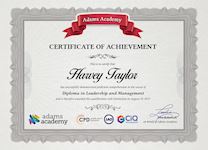'Information Technology Diploma Level 3' + 'Computer Fundamentals Level 2' - Two Accredited Courses for £63
Adams Academy
Summary
- Tutor is available to students
Overview
Course Highlights
- Internationally recognised accredited qualification
- 1 year accessibility to the courses
- Free e-Certificates
- Instant certificate validation facility
- Properly curated course with comprehensive syllabus
- Full-time tutor support on working days (Monday – Friday)
- Efficient exam system, assessment and instant results
- Access to the course content on mobile, tablet or desktop from anywhere anytime
- Eligible for **NUS Extra** card which gives you 1000’s of discounts from biggest companies.
Information Technology Diploma Level 3
Are you a computer geek who is interested in a career in the world of Information Technology? Then this is your chance to become an expert at IT. Follow your passion and get a job in the IT sector with this useful Diploma.
Information technology (IT) is the use of any computers, storage, networking and other physical devices, infrastructure and processes to create, process, store, secure and exchange all forms of electronic data. IT includes several layers of physical equipment (hardware), virtualization and management or automation tools, operating systems and applications (software) used to perform essential functions. User devices, peripherals and software, such as laptops, smartphones or even recording equipment, can be included in the IT domain.
Learn all you need to about Information Technology and improve your chances of a career in the IT world. Increase your chances of becoming either a Computer Programmer, Computer Systems Analyst, Database Administrator and many more as Information Technology will cover a vast area.
Computer Fundamentals Level 2
The Computer Fundamentals Level 2 course provides the basics or fundamental elements of the computer so that you can able to use the computer confidently and efficiently.
The course mainly focuses on the operating system and networking. Throughout the course, you will learn about hardware and peripherals, storage, connectivity devices, and network components. You will also be knowledgeable about the Operating System fundamentals such as the meaning of operating system, the procedures of configuring the operating system, application definition, and the ways of using control panel. Apart from these, the course will help you to know about the basic concepts of Software like how to use software, what is software licensing or what the different types of software tools are.
Finally, the course provides basic lessons about troubleshooting and explains the ways of using software, hardware, devices, peripherals, backup, and restore.
CPD
Course media
Description
COURSE CURRICULUM
Course 01: Information Technology Diploma Level 3
Computer Fundamentals
Basic Computer Terms
Advanced Terms
Networking Basics
Basic Internet Concepts
Internet Security
Computers in the Workplace
Tele-Commuting
The Electronic World
Ergonomics
Safety and the Environment
Being Proactive
Identifying Yourself
Protecting your Data
Understanding Malware
Protecting Against Malware
Computer Maintenance
Introduction
Understanding The Components Of A PC
Do You Need To Upgrade Your PC?
Essential Softwares You Must Have On Your PC
Installing And Organizing Your PC
Troubleshooting Guidelines
How To Speak To A Technician
Summary
Computer Programming
COMPUTER PROGRAMMING 101
WHAT IS COMPUTER PROGRAMMING AND WHY SHOULD I CARE?
What a Programmer Does
SOFTWARE LESSONS FOR BEGINNERS
Other Places to Find Computer Instruction
Comprehensive Computer Training for the Beginner
A Course in Computer Literacy
COMPUTER PROGRAMMING AT A GLANCE
UNDERSTANDING THE LANGUAGE OF THE COMPUTER
Computer Program Definitions
Choosing a Language
Computer Programming
Employment Outlook
How to Find A Great Job After Graduation
Computer Networking Basics
Introduction to Computer Networking
Types of Computer Networks
Types of Network Equipment
Ethernet
Wireless Local Area Networking
Internet Service
TCP/IP and Other Internet Protocols
Network Routing, Switching and Bridging
IT Communication
Basics of Computer Networking
Computer Networking Design and Solutions
Getting the Right Computer Network Hardware
Setting Up Your Computer Network
Wireless vs Wired
Cable Management for Wired Computer Network
Managing Your Network With Network Monitoring Tools
Computer Network Maintenance and Repair
Troubleshooting Computer Network Wrapping Up
Internet Security
Internet Security- The Truth About Identify Theft
Internet Security for Teens- What You Need to Do
Internet Security-Downloading Email Attachments
Internet Security- 5 Tips for Using Facebook
Internet Security- 8 Tips to Protect Yourself When Dating Online
Internet Security for Teens and Tweens- 10 Tips to Keep You Protected
Internet Security- Parental Control Software
Internet Security- Online Safety for Your Children
Cyber Bullying- Another Aspect of Breaking Internet Security
Tips to Ensure Internet Security
Internet Security- Downloading Music off the Internet
Internet Security- Protect Your Wireless Connection
Internet Security- How to Deal with Spyware
Internet Security- Protecting Yourself When You Shop Online
Internet Security- Make Sure Your Passwords Protect You
Make Sure Your Emails Are Safe: Tips for Internet Security
Internet Security- Why Should You Use a Firewall?
Internet security-Signs That Your Child’s Safety Might Be Compromised
Internet Security- Safety When Using Public Computers
Internet Security- Storing Your Password on Your Computer
Internet Security-Using Social Utility Sites
Course 02: Computer Fundamentals Level 2
Operating System Fundamentals
What is an Operating System
Configuring the Operating System
What is an Application
Using Control Panel
Computer and Network Terminology
Hardware and Peripherals
Storage
Connectivity Devices
Network Components
Working with Software and the OS
Software and Concepts
Licensing
Using Software
Software Tools
Troubleshooting
Software
Hardware, Devices, and Peripherals
Backup and Restore
Assessment & Certification
Once you complete all the lessons/units, you are required to sit an exam which is multiple-choice. The pass mark is 60%. After successfully passing the exam you can obtain your certificate of achievement at an additional cost of £8 each.
Who is this course for?
There is no experience or previous qualifications required for enrolment in this course. It is available to all students of all academic backgrounds.
Career path
This course opens a new door for you to enter the relevant job market and also gives you the opportunity to acquire extensive knowledge along with required skills to become successful in no time. You will be able to stand out in the crowd after completing this course. You will also be able to add our qualifications to your Resume and make yourself worthy in the competitive job industry.
Questions and answers
Currently there are no Q&As for this course. Be the first to ask a question.
Reviews
Currently there are no reviews for this course. Be the first to leave a review.
Legal information
This course is advertised on reed.co.uk by the Course Provider, whose terms and conditions apply. Purchases are made directly from the Course Provider, and as such, content and materials are supplied by the Course Provider directly. Reed is acting as agent and not reseller in relation to this course. Reed's only responsibility is to facilitate your payment for the course. It is your responsibility to review and agree to the Course Provider's terms and conditions and satisfy yourself as to the suitability of the course you intend to purchase. Reed will not have any responsibility for the content of the course and/or associated materials.



